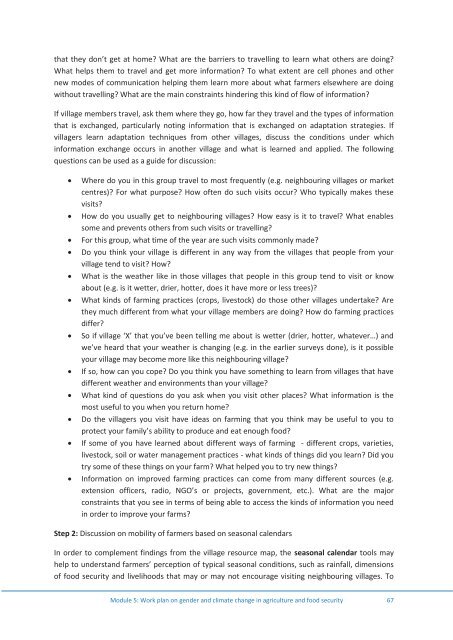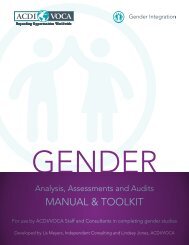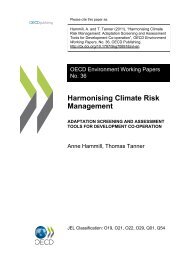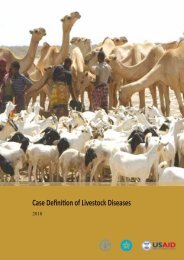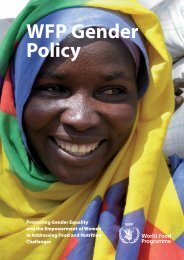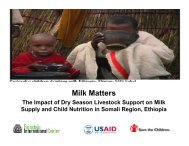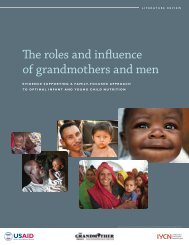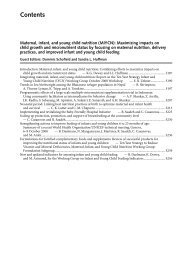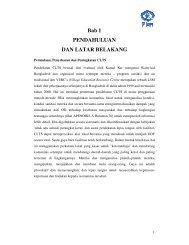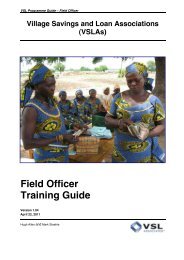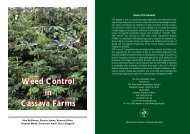Gender and climate change research in - FAO
Gender and climate change research in - FAO
Gender and climate change research in - FAO
Create successful ePaper yourself
Turn your PDF publications into a flip-book with our unique Google optimized e-Paper software.
that they don’t get at home What are the barriers to travell<strong>in</strong>g to learn what others are do<strong>in</strong>g<br />
What helps them to travel <strong>and</strong> get more <strong>in</strong>formation To what extent are cell phones <strong>and</strong> other<br />
new modes of communication help<strong>in</strong>g them learn more about what farmers elsewhere are do<strong>in</strong>g<br />
without travell<strong>in</strong>g What are the ma<strong>in</strong> constra<strong>in</strong>ts h<strong>in</strong>der<strong>in</strong>g this k<strong>in</strong>d of flow of <strong>in</strong>formation<br />
If village members travel, ask them where they go, how far they travel <strong>and</strong> the types of <strong>in</strong>formation<br />
that is ex<strong>change</strong>d, particularly not<strong>in</strong>g <strong>in</strong>formation that is ex<strong>change</strong>d on adaptation strategies. If<br />
villagers learn adaptation techniques from other villages, discuss the conditions under which<br />
<strong>in</strong>formation ex<strong>change</strong> occurs <strong>in</strong> another village <strong>and</strong> what is learned <strong>and</strong> applied. The follow<strong>in</strong>g<br />
questions can be used as a guide for discussion:<br />
<br />
<br />
<br />
<br />
<br />
<br />
<br />
<br />
<br />
<br />
<br />
<br />
Where do you <strong>in</strong> this group travel to most frequently (e.g. neighbour<strong>in</strong>g villages or market<br />
centres) For what purpose How often do such visits occur Who typically makes these<br />
visits<br />
How do you usually get to neighbour<strong>in</strong>g villages How easy is it to travel What enables<br />
some <strong>and</strong> prevents others from such visits or travell<strong>in</strong>g<br />
For this group, what time of the year are such visits commonly made<br />
Do you th<strong>in</strong>k your village is different <strong>in</strong> any way from the villages that people from your<br />
village tend to visit How<br />
What is the weather like <strong>in</strong> those villages that people <strong>in</strong> this group tend to visit or know<br />
about (e.g. is it wetter, drier, hotter, does it have more or less trees)<br />
What k<strong>in</strong>ds of farm<strong>in</strong>g practices (crops, livestock) do those other villages undertake Are<br />
they much different from what your village members are do<strong>in</strong>g How do farm<strong>in</strong>g practices<br />
differ<br />
So if village ‘X’ that you’ve been tell<strong>in</strong>g me about is wetter (drier, hotter, whatever…) <strong>and</strong><br />
we’ve heard that your weather is chang<strong>in</strong>g (e.g. <strong>in</strong> the earlier surveys done), is it possible<br />
your village may become more like this neighbour<strong>in</strong>g village<br />
If so, how can you cope Do you th<strong>in</strong>k you have someth<strong>in</strong>g to learn from villages that have<br />
different weather <strong>and</strong> environments than your village<br />
What k<strong>in</strong>d of questions do you ask when you visit other places What <strong>in</strong>formation is the<br />
most useful to you when you return home<br />
Do the villagers you visit have ideas on farm<strong>in</strong>g that you th<strong>in</strong>k may be useful to you to<br />
protect your family’s ability to produce <strong>and</strong> eat enough food<br />
If some of you have learned about different ways of farm<strong>in</strong>g - different crops, varieties,<br />
livestock, soil or water management practices - what k<strong>in</strong>ds of th<strong>in</strong>gs did you learn Did you<br />
try some of these th<strong>in</strong>gs on your farm What helped you to try new th<strong>in</strong>gs<br />
Information on improved farm<strong>in</strong>g practices can come from many different sources (e.g.<br />
extension officers, radio, NGO’s or projects, government, etc.). What are the major<br />
constra<strong>in</strong>ts that you see <strong>in</strong> terms of be<strong>in</strong>g able to access the k<strong>in</strong>ds of <strong>in</strong>formation you need<br />
<strong>in</strong> order to improve your farms<br />
Step 2: Discussion on mobility of farmers based on seasonal calendars<br />
In order to complement f<strong>in</strong>d<strong>in</strong>gs from the village resource map, the seasonal calendar tools may<br />
help to underst<strong>and</strong> farmers’ perception of typical seasonal conditions, such as ra<strong>in</strong>fall, dimensions<br />
of food security <strong>and</strong> livelihoods that may or may not encourage visit<strong>in</strong>g neighbour<strong>in</strong>g villages. To<br />
Module 5: Work plan on gender <strong>and</strong> <strong>climate</strong> <strong>change</strong> <strong>in</strong> agriculture <strong>and</strong> food security 67


